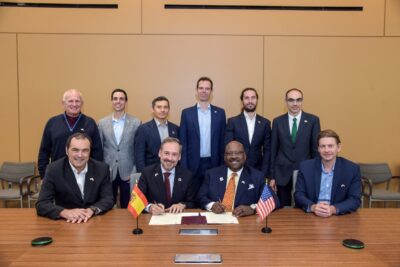
The Texas A&M Transportation Institute (TTI) recently signed a four-year memorandum of understanding (MOU) with the Universidad Politécnica de Madrid (UPM).
The MOU was formally signed at the TTI headquarters on Tuesday, Oct. 3 in Bryan, Texas. The stated signatories on the MOU included TTI Agency Director Greg Winfree, UPM’s Vice Rector for Internationalization Luis Ricote Lazaro and Director of the School of Civil Engineering José M. Atienza Riera. However, representing Lazaro and Riera during the official signing was UPM Rectors Delegate to USA and Canada ‐ Director for North America at RCC ‐Harvard, Luis Salgado.
The purpose of the MOU is to promote collaboration between TTI and UPM to advance research, technology transfer and education on transportation, supply chain and logistics issues, as well as other opportunities and technologies.
UPM is the largest Spanish technical university and an influential European higher education institution. It is recognized for its intensive research and innovation activity, its internationally accredited and recognized academic excellence and its interweaving into the fabric of national and international industry.
Affiliated with UPM is the Transyt Research Center (Transyt). Established within the School of Civil Engineering in 2002, Transyt stands as a preeminent institution dedicated to research and innovation in the field of transportation and traffic engineering. Transyt has consistently demonstrated leadership and expertise in addressing critical challenges related to urban mobility, traffic management and sustainable transportation systems.
“The MOU between TTI and UPM is the cornerstone of our collaborative success, and it will help consolidate TTI international reach, as well as our involvement in cutting edge initiatives in an important market such as Europe” says TTI Senior Research Scientist and former Director of the Latin-American Center of Logistics Innovation-México, Mario Monsreal. “It signifies the commitment of both institutions to advance research, innovation and knowledge exchange in the field of transportation, logistics and supply chain, as well as other new areas of great opportunity.”
The MOU outlines multiple activities, including:
- promote the exchange of information in areas of mutual interest and expertise;
- identify, develop, secure funding, and conduct collaborative research projects; and
- collaborate on developing and conducting academic courses and professional training programs on transportation and supply chain and logistics, in addition to other areas.
“This partnership empowers us to tackle complex challenges and pioneer solutions that have a profound impact on our communities and the world,” explains Monsreal. “This MOU has the potential to foster a global exchange of expertise and ideas; and provide access to new audiences, markets, and sponsors that could benefit both institutions and communities.”